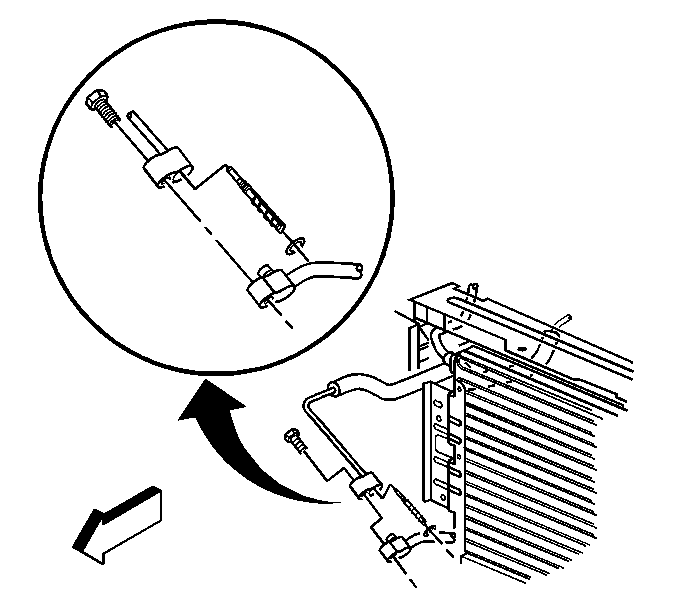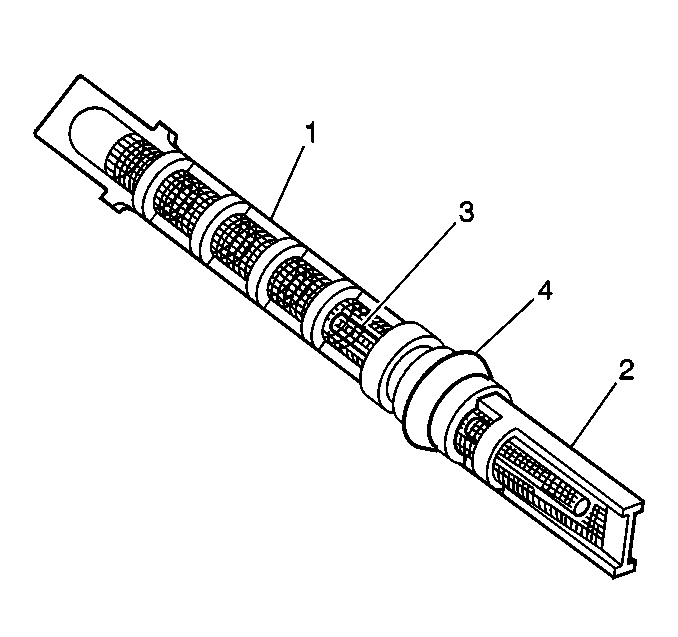Tools Required
Removal Procedure
Important:
| • | The expansion (orifice) tube is located at the condenser to evaporator
hose connection in the evaporator hose. |
| • | When you replace an expansion (orifice) tube, compare the design
of the orifice tube to the design of the replacement part for the correct
selection. The different styles of orifice tubes are not interchangeable. |

- Recover the refrigerant.
Refer to
Refrigerant Recovery and Recharging
.
- Raise the vehicle. Refer to
Lifting and Jacking the Vehicle
in General Information.
- Remove the bolt holding the evaporator hose assembly to the condenser.
- Remove the evaporator hose assembly from the condenser.
Important: Cap or tape the open end of the condenser line immediately to prevent
contamination.
- Remove and discard the O-ring seal.
- Remove the orifice tube using J 26549-E
.

- Inspect the expansion
(orifice) tube for the following conditions and clean or replace with a new
tube as indicated:
| • | Broken plastic frame; replace tube |
| • | Filter screen (1,2) torn, damaged or plugged with fine gritty
material; replace tube |
| • | Brass orifice tube (3) damaged or plugged; replace tube |
| • | Filter screen (1) coated with metal chips, flakes, or slivers;
coating may be removed with low pressure shop air and reused if cleaned satisfactorily |
| • | If reusing the tube, install a new O-ring (4). |
Installation Procedure

- Lightly coat the new orifice
tube O-ring seal (4) with mineral base 525 viscosity refrigerant oil.
- Remove the cap or tape from the evaporator line.
- Remove the cap or tape from the condenser line.
- Install the orfive tube usingJ 26549-E
- Using a lint-free, clean, dry, cloth, carefully clean the sealing
surfaces of the line fittings.

- Install a NEW O-ring seal
on the condenser tube.
Coat the O-ring seal with 525 viscosity refrigerant oil.
Notice: Use the correct fastener in the correct location. Replacement fasteners
must be the correct part number for that application. Fasteners requiring
replacement or fasteners requiring the use of thread locking compound or sealant
are identified in the service procedure. Do not use paints, lubricants, or
corrosion inhibitors on fasteners or fastener joint surfaces unless specified.
These coatings affect fastener torque and joint clamping force and may damage
the fastener. Use the correct tightening sequence and specifications when
installing fasteners in order to avoid damage to parts and systems.
- Install the evaporator
hose assembly and the bolt to the condenser.
Tighten
Tighten the bolt to 25 N·m (18 lb ft).
- Lower the vehicle.
- Evacuate and recharge the A/C system. Refer to
Refrigerant Recovery and Recharging
.
- Leak test the fittings of the component using the J 39400-A
.




